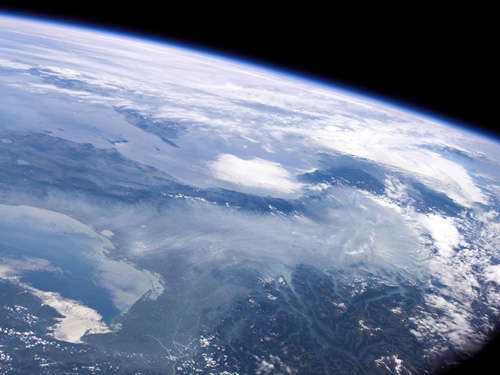(单词翻译:单击)
Even so, spaceships have to take care in the outer atmosphere, particularly on return trips to Earth, as the space shuttle Columbia demonstrated all too tragically in February 2003. Although the atmosphere is very thin, if a craft comes in at too steep an angle—more than about 6 degrees—or too swiftly it can strike enough molecules to generate drag of an exceedingly combustible nature. Conversely, if an incoming vehicle hit the thermosphere at too shallow an angle, it could well bounce back into space, like a pebble skipped across water.
即使这样,宇宙飞船在外层大气也不得不小心翼翼,尤其是在重返地球的过程中。2003年2月发生的“哥伦比亚”号航天飞机的悲剧就说明了这一点。虽然大气很薄,但要是飞船进入大气层的角度太大——大约6度以上——或者速度太快,它就会撞击大量分子,产生极易引起燃烧的拉力。反之,如果返程的飞行器进入大气层的角度太小,它很可能会弹回空间,就像掠过水面的卵石那样。
But you needn't venture to the edge of the atmosphere to be reminded of what hopelessly ground-hugging beings we are. As anyone who has spent time in a lofty city will know, you don't have to rise too many thousands of feet from sea level before your body begins to protest. Even experienced mountaineers, with the benefits of fitness, training, and bottled oxygen, quickly become vulnerable at height to confusion, nausea, exhaustion, frostbite, hypothermia, migraine, loss of appetite, and a great many other stumbling dysfunctions. In a hundred emphatic ways the human body reminds its owner that it wasn't designed to operate so far above sea level.
若要知道自己是如何离不开地面,你不必冒险去大气层的边缘,在任何地势很高的城市里生活过的人都会知道,你无须登上海拔几百米的高处,你的身体就会开始觉得不舒服。即使是有经验的登山运动员,虽然他们身体健壮、受过训练、带着氧气瓶,也很快会有高原反应:头脑不清呀,恶心呀,疲劳呀,冻伤呀,体温过低呀,没有胃口呀,以及许多别的机能障碍。人体会以各种强有力的方式提醒它的主人,它不适于在海拔太高的地方运转。
Even under the most favorable circumstances, the climber Peter Habeler has written of conditions atop Everest, "every step at that altitude demands a colossal effort of will. You must force yourself to make every movement, reach for every handhold. You are perpetually threatened by a leaden, deadly fatigue."
“即使在最有利的情况下,”登山运动员彼得·晗伯勒在写到珠穆朗玛峰顶上的情况时说,“在那个高度,每走一步都需要极大的意志力。你必须强迫自己往前走,抓住能抓住的地方。你永远有一种极度的按劳感。”


